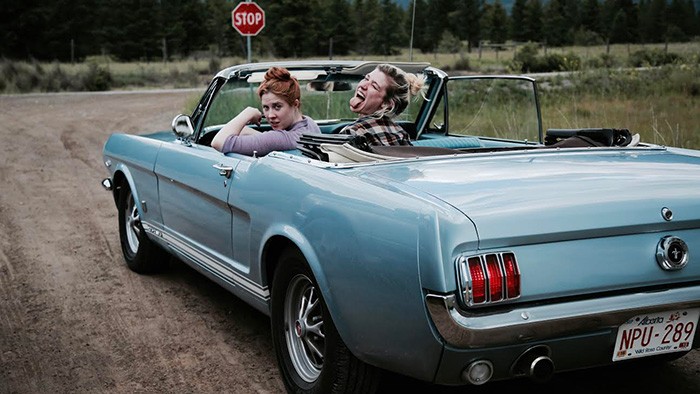Grief is a strange, personal, and often entirely unexpected reponse to tragedy. It will differ depending on who you are, the point in life you’re at, the cause, and myriad details spanning scenario, age, love, hate, or surprise. To cope with a grandparent’s death for example is something we all know is coming. We prepare ourselves for the inevitability and therefore find ourselves able to push through the pain with little to no trouble—depending on your relationship, of course. Conversely, the passing of someone still blessed with youth proves a gut-punch not easily shaken. Whether accident or disease or stupidity, the senselessness stemming from a shortened life scars. And when it’s impossible to wrap your head around the why, it’s generally just as difficult to move on.
We like to believe we can get through it by adopting a hardened façade or selective memory. Some of us wield anger as a defense mechanism, throwing blame around in order to mask the guilt and/or regret of not saying the things we wish we knew we didn’t have the time to say. Others will look to numb all feeling with drugs, alcohol, sex, gambling—addictive vices with the means to distract, deflect, and sadly destroy. So it’s crucial to see what’s happening to family members and friends. It’s important to read the signs and recognize when a person is falling too far into a self-made hole of isolated darkness to escape. The conundrum here is realizing how being close enough to help usually means you’re hurting too.

This is the reality for BFFs Faye (Erin Margurite Carter) and Ronnie (Grace Glowicki) in Jordan Canning’s resonately cathartic getaway adventure of the soul Suck It Up. The project began with a request from the acting duo to screenwriter Julia Hoff that asked for the creation of a story they could proudly produce and star in. From there arrived the characters, tone, and ultimately a premise shrouded under a cloud of sorrow with the potential of clear skies ahead. Its plot revolving around the death of Garrett (Ronnie’s brother and Faye’s ex-boyfriend) spoke to Canning, herself dealing with the cancer diagnosis of a loved one. So with a quartet of artists on-board with a passion to speak private truths with honesty (and therefore humor), a film was born.
A lot of credit for its success falls squarely on a script refusing to pander or fall victim to the usual aftermath of obvious clichés. Hoff and company ensure their audience is unaware of details that may shed light on how things got to where they are today: namely why Faye must ostensibly kidnap a drunken Ronnie from her home to seek clarity (and the fantastical pipedream of sobriety) at the latter’s family’s summer home in Invermere, British Columbia, Canada. For a long time we don’t know how long it’s been since Garrett’s death or his and Faye’s break-up. We don’t know when the last time these two women have seen each other either or the fact that Faye’s outward strength hides a pain equal to Ronnie’s heartbreak.

These revelations will arrive in due time, but first we must become aware of the starkly different places these characters find themselves. It’s important to see Ronnie as the out-of-control train wreck boozing her way through each day without the shame necessary to let puking at the dinner table wake her because we need a reason for straight-arrow, on-the-cusp-of-a-new-job with all her ducks in a row Faye to swoop in for the save. The idea is to enter their tragedy with a surface-level familiarity of their dynamic so truth’s complexity can authentically evolve out of the inevitable friction manufactured by their respective self-pity. We’re given a blatant pairing of weak (Ronnie) and strong (Faye) so we can discover just how worthless such easy labels prove under devastating circumstances.
It’s not that one cares and the other doesn’t—they merely present similar reactions in vastly different ways because they experienced Garrett’s death just as dissimilarly. One was pushed away, resentment filling a void left by betrayal. The other was there until the end so that every good memory of a healthy young man was replaced by the horrors of cancer and its unyielding power. As such they grew apart too. How could they not when the situation calls for an intrinsic choosing of sides for lack of a better term? Ronnie didn’t have the emotional ability to be her best friend’s shoulder to cry on when her brother needed her and Faye couldn’t lend support when doing so went against his wishes and reopened a fresh wound.

So this reunion/intervention is initially awkward while they feel each other out and discover the boundaries formed to trap vulnerability. They push and prod to the point of annoyance and rage, ultimately finding that they must relent and air their grievances rather than passive aggressively pretending the other is somehow at fault. To do so means introducing key periphery players positioned to coax them out of their defensive shells. And while this is the part where most films fall prey to stereotypes and conventions, Hoff and Canning ensure their support proves as imperfect and three-dimensional as their leads. “Good guys” embrace sexual opportunities (Dan Beirne), “cool guys” show empathetic restraint (Blake Gordey), and potential third wheels understand the delicacy of their place in the big picture (Toby Marks).
Suck It Up isn’t without odd choices—the climactic blow-up via mud fight with barflys hooting and hollaring before realizing it’s not the “sexy” catfight they thought—but its heart always being in the right place overcomes. Praise lands on Carter and Glowicki in this respect because both buy into their damaged characters with a depth of emotion that shines through the sanctimonious moments as well as the defenseless ones. Amidst all the rebellious twenty-something humor with surprise MDMA and the painful pairing of sex and insulin packs are moments of pure, from-the-heart release. A coerced escape for Ronnie evolves into an internal confrontation for Faye to realize she’s right there with her. And rather than let their pain drive them apart, it just might bring them together.
Suck It Up is now playing Los Angeles’ Laemmle Monica Film Center with more cities to follow.

